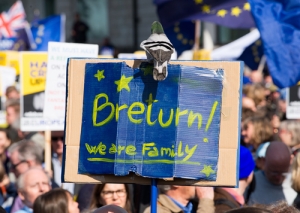
Photo by John Gomez / Shutterstock.com
On a sunny day at the end of March this year, I joined one of the politest, least threatening crowd of demonstrators central London has ever seen. Tens of thousands of us marched, both to mark the 60-year anniversary of the founding of what later became the European Union, and to protest our opposition to Brexit. This genteel crowd was roused and upset, but instead of angrily chanting slogans emblazoned on mass produced posters, they wryly savoured the original witticisms that many had composed on hand-crafted banners and placards.
Despite the quintessentially British values of this good-natured crowd, many politicians and media pundits poured out hatred against even this gentle, heartfelt protest. Some said we should have given in to terrorism and cancelled our protest in light of the attack on Parliament a few days prior. Others called us Remoaners and told us the matter of Britain’s relationship with Europe had been settled in last year’s referendum. How dare we calmly and quietly stand up for what we believed in?
Surprised even at the need to demonstrate in the first place, we found it hard to come to terms with such reactions. Here was metropolitan, professional Britain, bemused at suddenly being the underdog. We’d always believed that the country shared our values and aspirations — that reasonable, educated, cultured people like us would always be trusted to pull the levers of power. By some unexpected electoral fluke, suddenly we had found ourselves disempowered.
Remain was complacent
In truth, our complacency had been our undoing. Our side, Remain, lost the referendum campaign because it took it for granted that we would win. Therefore our leaders never bothered to address the contradictions in their own stance, wrongly confident that the populace would bow to reason, as they always had in the past. This false confidence was bolstered by the knowledge that Leave had not done its homework, and that its arguments had no basis in fact.
But Remain therefore never bothered to do its homework either. It lazily relied on the bland assertions of experts, and never managed to convey how intricately tied our membership of the EU was to the crucial work of agencies such as Euratom and the London-based European Medicines Agency, or to national priorities such as the peaceful operation of the border between Northern Ireland and Eire. It kept quiet about the many times successive governments had blamed the EU for decisions taken domestically — for example, the switch from blue to maroon passports, or the decision to save money by not enforcing EU-approved restrictions on freedom of movement.
Neither did Remain ever pick up on or challenge the contradictions in the Leave campaign’s concurrent advocacy for mutually exclusive models of Brexit, from Norway to WTO. And it never explained how the EU enhances prosperity, not only for those who are already privileged, but more importantly for those adversely affected by a globalised, digital economy.
We let the country down
In these omissions, the Remain campaign let the country down as badly as the lies of the Leave campaign — perhaps worse, because at least Leave had listened to the people’s grievances, even if its remedies weren’t going to fix them.
To understand how Remain came to bring this defeat upon itself, we need to dig back further into recent political history. The Brexit vote is a symptom of a broader change in the politics of Britain, one that planted its roots a decade or more ago.
Tied up in that broad sweep of change is the narrower question of why the Liberal Democrats ultimately failed in their self-appointed coalition role as the country’s brake on extremist politics — and the related question of why all those metropolitan professionals never fully got behind the party.
In a series of five posts over the next week* or so I plan to set out my take on these matters, and what it all means for the future of the LibDems.
* In retrospect, it turns out it’s been more than a month, but rest assured they are on their way.
Pingback: The gentrification of British politics (Where next for LibDems? 2/5) | Raw Liberal